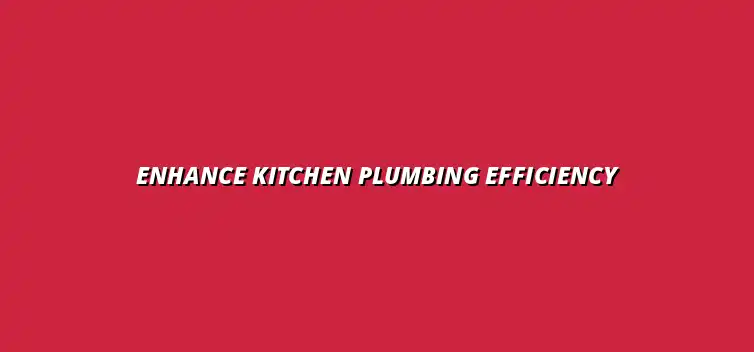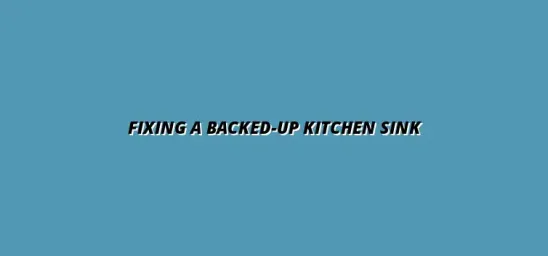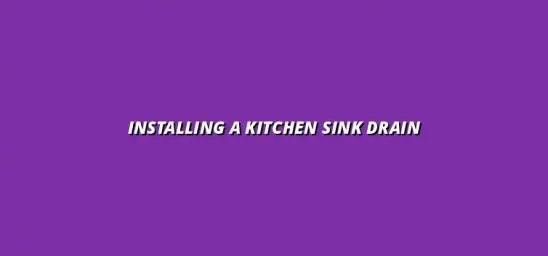
Enhance Kitchen Plumbing Efficiency
Enhancing Kitchen Efficiency Through Plumbing Upgrades
When it comes to our kitchens, having an efficient plumbing system is essential. Not only does it make cooking and cleaning easier, but it also impacts water usage and costs. By focusing on kitchen plumbing upgrades, homeowners can enjoy a more functional space while conserving water and energy.
Upgrading your kitchen plumbing can seem daunting, but understanding its importance is the first step. Efficient plumbing systems help prevent leaks, reduce waste, and enhance the overall performance of kitchen appliances. These upgrades can lead to significant improvements in daily tasks, making them a worthwhile investment. For example, learning how to fix a leaky faucet can save you money and water.
Understanding the Importance of Upgrading Kitchen Plumbing
Many people might overlook their kitchen plumbing until a problem arises. However, understanding the benefits of upgrading plumbing can save you from future headaches. By making these changes, you can improve water efficiency, enhance comfort, and even elevate your home's value.
Here are a few reasons why upgrading kitchen plumbing is essential:
- Reduced water bills: Efficient plumbing can significantly lower water consumption.
- Prevention of leaks: New fixtures and pipes help avoid costly leaks and damage.
- Better appliance performance: Upgraded plumbing ensures appliances function at their best.
Why Kitchen Plumbing Efficiency Matters for Homeowners
For homeowners, plumbing efficiency isn't just a luxury; it's a necessity. Efficient plumbing systems contribute to a more enjoyable cooking and cleaning experience. When every fixture works as it should, you can save time and avoid stress in the kitchen.
Furthermore, efficient plumbing can enhance the resale value of your home. Potential buyers are often attracted to properties with modern, well-maintained systems. This means investing in plumbing upgrades could pay off when it's time to sell!
Common Plumbing Issues Affecting Kitchen Performance
Just like any other part of a home, kitchen plumbing can face various issues. Understanding these problems can help you know when it's time for an upgrade. Some common plumbing issues include:
- Clogged drains: Build-up from food particles can lead to slow drains. Addressing a clogged kitchen sink quickly prevents larger problems.
- Leaky faucets: Constant drips not only waste water but can also drive up your bills.
- Old pipes: Aging pipes can corrode and affect water quality.
Addressing these issues promptly can lead to better kitchen performance and more savings in the long run. A proactive approach to plumbing can help prevent bigger problems down the line!
Identifying Key Areas for Plumbing Improvement in the Kitchen
Before diving into upgrades, it's essential to assess your current kitchen plumbing system. This evaluation will allow you to identify areas that need improvement. By focusing on the right spots, you can maximize the efficiency of your upgrades.
Start by looking for signs of wear and tear in your plumbing. This might include checking for leaks, rust, or outdated fixtures. Understanding these key areas will help you make informed decisions about where to invest. Regular inspections can help prevent costly repairs.
Assessing Current Kitchen Plumbing Systems
Examine your kitchen's plumbing components to gain insight into their condition. Look for:
- Faucets and sinks: Assess if they function properly and are easy to use.
- Pipes: Inspect for signs of leaks or corrosion.
- Drainage system: Ensure water flows smoothly without clogs.
By regularly assessing these components, you can maintain optimal functionality and catch issues before they escalate.
Determining Areas with High Water Usage
Next, identify which areas of your kitchen use the most water. This can help prioritize upgrades that will yield the most significant savings. Common high water usage areas include:
- Sinks: The primary source of water use in the kitchen.
- Dishwashers: Appliances that can consume a lot of water if not efficient.
- Refrigerators: Models with ice makers and water dispensers.
Remember to schedule an annual water heater inspection to ensure efficiency and longevity.
By focusing on these high-usage areas, you can make targeted upgrades that will enhance efficiency and reduce water waste.
Upgrading Fixtures for Improved Water Conservation
One of the most effective ways to enhance kitchen efficiency is by upgrading fixtures. Choosing high-efficiency faucets and sinks can significantly reduce water consumption. Furthermore, integrating water-saving appliances can make a noticeable difference in your daily routines.
Investing in these upgrades not only conserves water but can lead to lower utility bills. It’s a win-win for your wallet and the environment!
Choosing High-Efficiency Faucets and Sinks
When selecting new faucets and sinks, consider models designed for efficiency. Look for features such as:
- Low flow rates: Faucets with lower flow rates save water without sacrificing performance.
- Touchless technology: Sensors can help reduce water waste.
- Durable materials: Opt for fixtures made of robust materials that last longer.
These choices not only improve efficiency but also add a modern touch to your kitchen!
Integrating Water-Saving Appliances
In addition to fixtures, consider upgrading to water-saving appliances. This includes dishwashers and refrigerators that use less water while providing excellent performance. When shopping, prioritize appliances that have the Energy Star label.
Some benefits of these appliances include:
- Improved efficiency: Many modern appliances are designed to use less water.
- Cost savings: Lower water usage leads to reduced utility bills.
- Environmental impact: Less water use is better for the planet!
Making the switch to water-saving appliances is an excellent step towards a more efficient kitchen.
Adopting Advanced Plumbing Technologies for Kitchen Efficiency
As technology advances, so do plumbing solutions. Adopting modern technologies in your kitchen can lead to even greater efficiency. Smart plumbing solutions can optimize water use and improve the overall functionality of your kitchen.
By integrating these advanced technologies, you can enjoy a kitchen that not only looks great but also performs exceptionally well!
Exploring Smart Plumbing Solutions
Smart plumbing solutions offer a range of benefits for homeowners. These technologies can help monitor water usage, detect leaks, and even control water flow remotely. Some popular options include:
- Smart faucets: Faucets that can be controlled via mobile devices.
- Leak detectors: Sensors that alert you to leaks before they become significant problems.
- Automated irrigation: Systems that optimize water use for gardening.
By embracing these innovations, you can take your kitchen plumbing to the next level!
Benefits of Instant Hot Water Dispensers
One exciting advancement in kitchen plumbing is the instant hot water dispenser. These appliances provide hot water on demand, making tasks like cooking and cleaning much easier. Benefits include:
- Convenience: Instant access to hot water saves time.
- Efficiency: Reduces the need to run the tap while waiting for hot water.
- Versatility: Great for making tea, coffee, or cooking.
Incorporating an instant hot water dispenser into your kitchen can significantly enhance its efficiency!
Planning a Successful Kitchen Plumbing Upgrade
Once you've identified the areas for improvement, it's time to plan your plumbing upgrade. A well-thought-out plan ensures you stay within budget and achieve the best results. Taking the proper steps can make the upgrade process smooth and efficient.
By carefully planning, you can make better decisions that lead to lasting improvements in your kitchen.
Setting a Budget for Plumbing Improvements
Establishing a budget is crucial before starting any plumbing upgrade. Take into account the costs of materials, labor, and potential unexpected expenses. Here are some tips for budgeting:
- Research costs: Gather estimates for fixtures, appliances, and labor.
- Prioritize needs vs. wants: Focus on essential upgrades before considering luxurious additions.
- Set aside a contingency fund: Prepare for unexpected expenses that may arise during the project.
A well-defined budget will help you stay on track and avoid overspending.
Choosing the Right Professionals for Installation
Hiring qualified professionals is essential for a successful plumbing upgrade. Experienced plumbers can ensure the work is done correctly and efficiently. For reliable service in Birmingham, consider a plumber in Billesley, Birmingham. When selecting a plumber, consider the following:
- Check credentials: Verify licensing and insurance status.
- Read reviews: Look for feedback from previous customers to gauge reliability.
- Get multiple quotes: Compare estimates from different professionals to find the best deal.
Choosing the right professionals can make all the difference in the success of your plumbing projects!
Common Questions Regarding Kitchen Plumbing Upgrades
As you consider plumbing upgrades, you might have some questions. Understanding the answers to these common queries can help guide your decisions. Here are a few frequent questions homeowners ask:
How often should kitchen plumbing be upgraded?
It's generally a good idea to evaluate your kitchen plumbing every 10 to 15 years. However, if you notice any signs of leaks or inefficiency, it may be time to consider upgrades sooner. Regular assessments can help keep your plumbing in excellent condition.
What are the signs that plumbing needs attention?
Be on the lookout for these signs that indicate your plumbing may need an upgrade:
- Frequent leaks: If you experience consistent leaks, it's time to take action.
- Low water pressure: This may indicate a problem within the plumbing system.
- Unpleasant odors: Foul smells can indicate plumbing issues that require immediate attention.
For helpful tips on maintaining your kitchen plumbing, see our guide on essential kitchen plumbing maintenance tips.
Being proactive about these signs can help maintain a well-functioning kitchen!
Maximizing Your Kitchen's Potential with Efficient Plumbing
Upgrading your kitchen plumbing is not just about fixing leaks or replacing old pipes. It’s about transforming the entire space into a more efficient and functional area. When you optimize your plumbing, you're not only enhancing your daily cooking experiences but also laying the groundwork for lasting benefits—both financially and in terms of your home’s value!
Let’s dive into the long-term advantages that come with these upgrades. You’ll see how smart investments can lead to tangible rewards, creating a win-win situation for you as a homeowner.
Long-Term Benefits of Upgrading Kitchen Plumbing
When I consider upgrading my kitchen plumbing, I always think about the cost savings that come from improved water efficiency. With the right upgrades, you can significantly reduce your water bills while also conserving this precious resource. Here are some key benefits:
- Lower Utility Bills: Efficient fixtures and appliances use less water, leading to noticeable savings each month.
- Extended Lifespan: Upgrading to modern plumbing systems can prevent future costly repairs, improving the overall longevity of your fixtures.
- Environmental Impact: Conserving water helps reduce your ecological footprint, making you a more responsible homeowner.
Beyond cost savings, modern plumbing systems can greatly enhance your home’s value. Potential buyers are increasingly looking for properties equipped with updated plumbing fixtures. This can set your home apart in a competitive market, allowing for a better return on investment if you decide to sell.
Cost Savings through Water Efficiency
Water efficiency is much more than just a trendy phrase. By switching to fixtures that use less water, you can expect significant savings. For example, installing low-flow faucets and Energy Star-rated dishwashers can reduce your daily water use dramatically!
- Low-Flow Faucets: Save up to 30% more water compared to standard faucets.
- Energy Star Appliances: Use less water and energy, making them a smart choice for eco-conscious homeowners.
- Tankless Water Heaters: Provide hot water on demand, reducing wasted water while waiting for the tap to heat up.
Making these changes not only helps with your bills but also contributes to a more sustainable future.
Enhancing Home Value with Modern Plumbing Systems
Investing in modern plumbing systems can significantly boost your home’s resale value. Homebuyers are often willing to pay more for a property that features efficient plumbing solutions. Items like upgraded sinks, faucets, and high-efficiency appliances are highly desirable!
- Updated Fixtures: New, stylish fixtures can instantly enhance the look of your kitchen.
- Improved Functionality: Modern systems operate more efficiently, appealing to prospective buyers.
- Smart Technology: Incorporating tech-savvy plumbing solutions can make your home stand out.
In essence, upgrading your plumbing not only pays for itself over time but can also offer a great return when it's time to sell your home.
Maintaining Upgraded Plumbing Systems for Longevity
Once you’ve upgraded your kitchen plumbing, it’s crucial to maintain it to ensure longevity. Regular maintenance can help prevent issues before they escalate into costly repairs. Here are some essential practices:
- Inspect Regularly: Check for leaks and corrosion at least twice a year.
- Clean Drains: Avoid clogs and buildup by regularly cleaning your drains with safe methods. Learn more about preventing kitchen drain blockages.
- Flush Water Heaters: Annually flushing your water heater can help maintain its efficiency.
Taking these steps can greatly enhance the durability of your kitchen plumbing, ensuring that your upgrades work effectively for years to come!
Regular Maintenance Practices to Ensure Efficiency
Regular maintenance is the key to keeping your plumbing systems running smoothly. By establishing a routine, you can catch minor issues before they turn into major problems. Here are some effective maintenance practices:
- Monitor Water Pressure: Keep an eye on water pressure; too high can damage pipes.
- Use Strainers: Install strainers in sinks to prevent food debris from clogging pipes.
- Schedule Professional Inspections: Have a licensed plumber inspect your systems every few years.
Regular upkeep is vital for maximizing your home's plumbing efficiency and functionality.
Tips for Homeowners to Prevent Future Plumbing Issues
Preventing plumbing issues is much easier than dealing with them after they’ve occurred. Here are some proactive tips that I find useful:
- Avoid Chemical Cleaners: Use natural solutions to keep your drains clear without damaging pipes.
- Don’t Ignore Small Leaks: Address leaks immediately to prevent bigger problems later.
- Mind What You Flush: Only flush toilet paper and human waste to avoid clogs.
By following these simple guidelines, you can enjoy a stress-free kitchen plumbing experience!
Choosing the Right Upgrades for Your Kitchen Plumbing
When considering upgrades for your kitchen plumbing, it’s essential to evaluate your options based on your kitchen's layout and needs. Every kitchen is unique, and so should be your upgrades!
By choosing upgrades tailored to your specific situation, you can maximize efficiency and functionality. Here are some considerations:
Evaluating Options Based on Your Kitchen's Layout
Your kitchen layout will significantly influence the type of plumbing upgrades you should pursue. Here are some key factors to consider:
- Fixture Placement: Ensure that new fixtures fit well with existing plumbing lines.
- Space Constraints: Consider the available space for new sinks or appliances.
- Flow Optimization: Aim for a layout that maximizes efficiency during food prep and cleanup.
By keeping these points in mind, you can choose upgrades that enhance both your kitchen’s appearance and functionality.
Understanding Local Plumbing Codes and Regulations
Before making any upgrades, it's important to familiarize yourself with local plumbing codes and regulations. Following these guidelines ensures that your upgrades are legal and safe.
- Check with Local Authorities: Contact your local plumbing authority for specific requirements.
- Hire Licensed Professionals: Ensure that any work done meets local codes.
- Stay Updated: Regulations may change, so keep informed about any updates that might affect your upgrades.
Understanding and adhering to plumbing codes can save you time, money, and headaches down the road.
Future Trends in Kitchen Plumbing Efficiency
As technology advances, kitchen plumbing is evolving. Staying informed about emerging trends can enhance your kitchen’s efficiency even further! Here are some exciting developments to consider:
Sustainable Plumbing Solutions to Consider
Sustainability is becoming a priority in home renovations, including plumbing. By choosing eco-friendly options, you can make a positive impact:
- Greywater Systems: Reuse water from sinks and showers for irrigation.
- Rainwater Harvesting: Collect rainwater for non-potable uses.
- Solar Water Heaters: Use the sun's energy to heat water efficiently.
These solutions not only save water but also help lower your energy bills!
The Rise of Eco-Friendly Water Management Systems
New water management systems are emerging that focus on efficiency and conservation. These systems can help track water usage and identify leaks early:
- Smart Water Meters: Monitor water usage in real-time.
- Leak Detection Sensors: Alert you to leaks before they cause damage.
- Automated Irrigation Systems: Optimize watering schedules based on weather data.
Investing in these technologies can further enhance the efficiency of your kitchen plumbing while also being kind to the planet.
Encouraging Action Towards Kitchen Plumbing Upgrades
Now that we’ve discussed the benefits and options for upgrading your kitchen plumbing, it’s time to take action! The first step is often the hardest, but the rewards are well worth the effort.
Here’s how you can start making improvements today:
Steps to Take Immediately for Improved Kitchen Plumbing
If you’re ready to dive into upgrading your kitchen plumbing, here are some immediate steps you can take:
- Conduct a Self-Assessment: Identify areas in your kitchen that could benefit from upgrades.
- Set a Budget: Determine how much you’re willing to invest in improvements.
- Research Options: Look into fixtures and technologies that align with your goals.
- Consult Professionals: Reach out to licensed plumbers for expert opinions and estimates.
Taking these steps will help pave the way for successful kitchen plumbing upgrades!
Resources for Homeowners Seeking Plumbing Solutions
As a homeowner, you have access to numerous resources to guide you in your plumbing upgrades. Here are some useful tools and platforms to assist you:
- Online Reviews: Websites like Yelp or Angie’s List can help you find reputable contractors.
- DIY Guides: Platforms like YouTube offer video tutorials for minor upgrades.
- Home Improvement Stores: Local stores often have knowledgeable staff to answer your questions.
By leveraging these resources, you can make informed decisions and ensure your kitchen plumbing upgrades are a success!





Fixing a Backed-Up Kitchen Sink
Prepare Your Plumbing for Weather
Installing a Kitchen Sink Drain
When to Replace Plumbing Fixtures
Fixing a Jammed Garbage Disposal